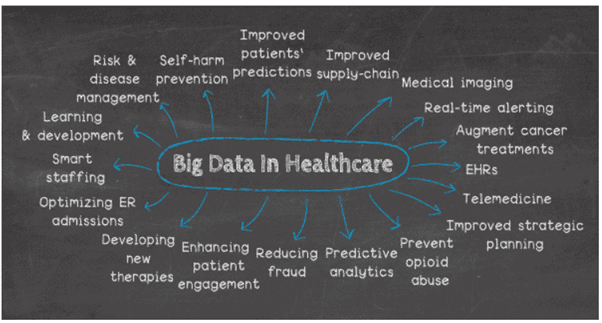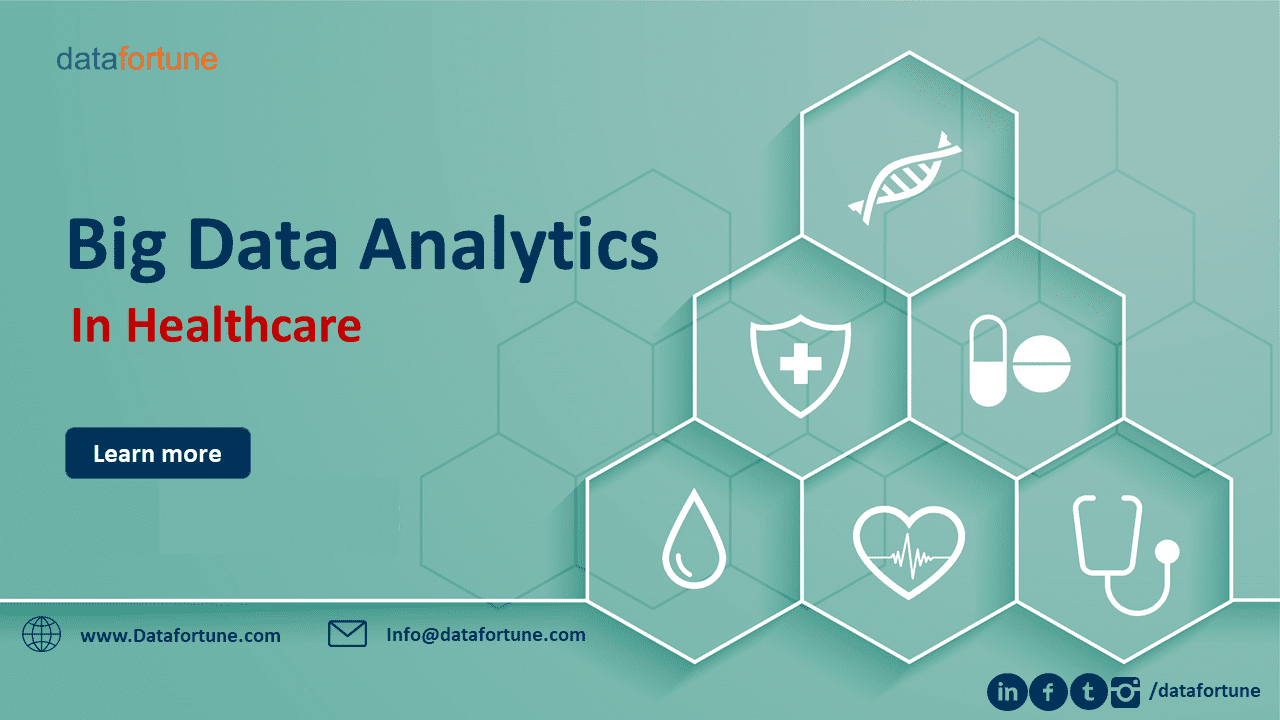Big Data Analytics in Healthcare
Big data analytics has revolutionized the way businesses manage, analyse, and leverage data across industries. One of the most prominent fields where data analytics is making notable changes is healthcare.
The International Data Corporation Report has revealed big data has been projected to flourish more rapidly in healthcare than in industries like manufacturing, financial, media and others. It is also very likely to experience a compound annual growth rate of 36% by 2025. The ABSNewsWire Research concludes, the global big data in healthcare will cross the $34.25 billion by 2022.
Data Analytics in Healthcare:

Before diving into Data Analytics in healthcare, let’s examine what Big Data is.
IBM defines Big data analytics as the use of advanced analytic techniques against very large, diverse data sets that include structured, semi-structured and unstructured data, from different sources, and in different sizes from terabytes to zettabytes.
For years accumulating massive amounts of data for medical use has proven expensive and time-consuming. With the advent of new technologies, it has become easier not only to collect & store such volumes of data but also to create extensive healthcare reports and convert them into relevant insights that can then be used to provide better solutions and care.
Big data when applied to healthcare is a term used to describe enormous volumes of data created by the implementation of digital technologies that gather patients’ records and help in managing hospital performance, otherwise too comprehensive and intricate for traditional technologies.
Adoption of Big Data in healthcare can reduce costs of treatment, foretell epidemics outbreaks, dodge preventable illnesses, and improve the quality of life in general.
In this blog, we’re going to explore the need for big data in the healthcare sector and how it can change the game for the healthcare industry in the days to come.
How Big Data Analysis Can Change The Healthcare Scenario:
- Health Tracking:
The IoT (Internet of Things) devices not only generate a large amount of data, but also makes it easier to record wirelessly. Apart from the basic wearable devices that are able to detect the patient’s sleep, heart rate, exercise, distance walked, etc, there are new innovations monitoring the patient’s blood pressure, pulse, glucose and more.
The continuous assessment of the body vitals combined with the sensor data collection will allow healthcare organizations to keep people out of the hospital since they can identify potential health issues and offer the necessary care before the situation gets worse.
- Assistance To High-Risk Patients:
If all the hospital records are digitized, the saved data can be accessed to understand the unusual patterns if any, of many patients. The patients visiting the hospital repeatedly, their chronic issues and symptoms can be analysed in advance. Such understanding will help in giving these patients better care and provide an insight into corrective measures to reduce their frequent visits. This will be of great help to the person at a higher risk of any medical emergency.
- Prevention Of Human Errors:
Sometimes, accidentally a wrong prescription is given to the patient or less effective medication is suggested. As big data can be leveraged to analyse the correct treatment method for the specific problem, such errors can be completely avoided. This revolution will be of great help to the doctors who need to attend to several patients in a day.
- Advancements In The Sector:
The AI powered applications can surf through a walloping volume of data within seconds to find the solution for a complex problem. Such advancement is already in progress and will continue to grow with the research collected by Big Data Analytics in healthcare. Not only accurate but personalized solutions can be recommended.
- Reducing The Treatment Cost & Other Overheads:
Big Data Analytics in healthcare can be a great solution to save costs for hospitals that either over or under book staff members & infrastructure. Predictive analysis can help resolve this issue by predicting the admission rates and help with staff allocation. Similarly with bookings of rooms or OTs, patterns can easily be identified deploying algorithms to analyse big data that help hospitals be aware of any such seasonal variations.
Predictive analysis, the most important and relevant part of big data analytics in healthcare, fetches a greater ROI for the hospitals, and is being deployed by around 47% of the organizations, states the Society of Actuaries study.
Types Of Healthcare Analysis:
In general there are four main types of big data analytics in healthcare.
- Descriptive Analysis: Using past data to get insights regarding trends & patterns in the form of a dashboard.
- Predictive analysis: Using various analysis models, this predicts what’s likely to happen in future.
- Discovery Analysis: Based on the current situation, the discovery analysis focuses on what is needed to be explored further.
- Prescriptive Analysis: Leveraging Machine learning, the types of actions and their related consequences are studied to suggest an effective course of action or the strategy.
A report by Fingent Group calculated that effective use of big data could add $300 million per year to the healthcare industry.
Big data analytics in healthcare can enhance the capabilities of related organizations and can be used to:
- Predict Epidemics
- Increase preventable care
- Begin preventive care earlier
- Spot the warning signs much earlier
- Cure the diseases effectively to improve general well-being of society
Winding Up:
All elements of Big Data are not fully utilized currently due to limitations of the toolset and funds. It is prudential to invest in the future and use Big data analytics in healthcare to be at the forefront of an evolving Industry. The organization instead of developing their in-house team, can also take assistance from professional service providers, to get the tasks done fast and easy.
Big data applications are definitely the future.
Datafortune For Big Data Analytics In Healthcare Industry
After letting our work speak for ourselves in the manufacturing, financial, service sectors and more, Datafortune is making a striking impression in the healthcare industry. Our secret is in helping our customers use their data effectively resulting in them taking logical data driven decisions that are right for the business.
Trusted, recognized and renown, we create custom data analysis tools and convert them into meaningful information for your business.
With our team of dedicated data buffs and state-of-the-art technology, together we can revolutionize the way you function or manage operations on a daily basis.
For more enquiries, visit our contact us page or write to us at info@datafortune.com



